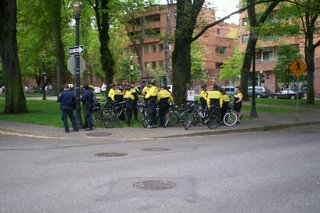I was driving home this evening listening to the news, when I thought I heard the list of movie receipts for the weekend. Yes, there they were. And the radio was claiming that the Da Vinci Code had the highest by far on the weekend, and was set to break all sorts of records. Or something to that effect.
I was at the same time sickened, in the way that one would be if he learned that millions of people had voluntarily walked into Nazi gas chambers, and unsurprised.
I say unsurprised because I was having an Email conversation with a friend of mine last week regarding the release of the film and he sent me this little snippet from Peggy Noonan:
I do not understand the thinking of a studio that would make, for the amusement of a nation 85% to 90% of whose people identify themselves as Christian, a major movie aimed at attacking the central tenets of that faith, and insulting as poor fools its gulled adherents. Why would Tom Hanks lend his prestige to such a film? Why would Ron Howard? They're both already rich and relevant. A desire to seem fresh and in the middle of a big national conversation? But they don't seem young, they seem immature and destructive. And ungracious. They've been given so much by their country and era, such rich rewards and adulation throughout their long careers. This was no way to say thanks.
And I responded that it made perfect sense for people who routinely walk around parading the fact that they have no faith in anything except money to make a movie based on a uber best seller. How many of the people in this country that claim to be Christian are not just doing so because they feel some cultural affinity for the religion, or they somewhat believe in God, but only one they can contain.
I mean look at the book sales.
This article was written last week, as well, when at the time critics were giving the thing such a tongue lashing that any reasonably self proclaiming pundit who wanted an easy prediction with which to stun the masses could latch onto and write a column of doom. I have to admit that after reading reviews like this, and this it’s hard to want to see the thing at all.
The one thing that really shocked me was the movie's underlying intention, stated several times with great clarity: the depth and passion of its anti-Christian, anti-monotheism craziness. To say the movie wishes actually to be the anti-Christ would only sound extravagant; still that is the constant and underlying message. The "heroes" of the film have to save the world from the oppression and injustice brought into it, not only by Christianity, but by all monotheistic religions.
Nice. The New York Times:
"The Da Vinci Code," which opened the Cannes Film Festival on Wednesday, is one of the few screen versions of a book that may take longer to watch than to read.
Michael Novak:
In short, there is enough in this film to offend everybody.
Afterwards, I sure felt like a strong double bourbon. And I felt eager to forget as soon as I can the sheer malicious hatred that swirls up from this film.
Rolling Stone (Hat tip Moderate Voice):
There's no code to decipher. Da Vinci is a dud — a dreary, droning, dull-witted adaptation of Dan Brown's religioso detective story that sold 50 million copies worldwide.
Conservative elements in the Catholic Church are all worked up over a plot that questions Christ's divinity and posits a Vatican conspiracy to cover up Jesus Christ's alleged marriage to Mary Magdalene and to drive all things feminine from the church. Here's the sure way to quiet the protesters: Have them see the movie. They will fall into a stupor in minutes. I know it bored me breathless.
And these are just a few, believe me. So why is the movie doing so well? Is it because when Catholics squawk people yearn to defy the church and go see it in defiance? That’s certainly been brought up by a number of people. What if the church had just let this alone (please humor my leap into the impossible for a moment)?
How many people these days actually do stuff because the church actually tells them to? Really. Considering the slide in spiritual faith over the last 40 years, I’m surprised that the culturally secular segment of American society even stops to notice that the church even exists these days, except perhaps to snark condescendingly at them whenever a priest does something he shouldn’t have (which reminds those of us in the faith how close we all are to crossing the line).
The best argument against the church being the instigator in all this comes from a guy named David Wayne.
Could it be that the church has been faithfully telling the story all along and the world doesn't find it compelling because they hate Jesus? Of course we've butchered the story many times, but this whole idea that the world finds DVC compelling because we have failed to make the true story compelling is patently false. The true story of Jesus tells us that if we tell the story truly, the world will not find it compelling, rather they will reject it. Thus, it is far more likely that the world finds DVC more compelling simply because it tells the story of a Jesus who is more to its liking.
Zing! Read John 15:18-25.
Ok, so last week I was Ill and bedridden, so I finally settled down and read the Da Vinci Code in full. Just short of 500 pages in paperback, it’s not exactly the most intriguing page turner in history, but Brown’s not all that bad a writer, and it had enough movement and a great mystery to solve with some pretty inventive cryptography to help with the mystery. That part was fun.
The hard part is that he interspersed the entire book with this heavy and frequent lathering of conspiracy history and pagan religious history from two of the main characters. You have to admit, that Brown really did his homework here. He found probably every disparate bit of pagan and religious and cultural information that sounded feminine in any way and tied them together into a semi convincing religion. On paper anyway.
Once you get away from the story, his religion really falls apart. I though this part of the book was the most tedious anyway. I hate conspiracy themes in books, or at least this one (and the last one I read) dragged the rest of the book down a bit. It was just too hard to believe in certain sections.
The book is written to be exciting and full of "facts" that support the main protagonists and the quest that they are on. You get the impression that they are the good guys and the Catholics are the real bad guys. The facts presented seemed to outlandish to be believed, and one thing about novels like this is that if you are going to build a story on something as weird as a conspiracy theory or that challenges current dogma, you'd better back up where you are getting all this stuff. He writes a lot like Michael Crichton, except that Crichton is brainy, convincing and doesn't get all weird about spiritualist stuff. Crichton also backs up what he writes about. In the one book where he presents factoids to support his plot line, State of Fear, which is about global warming, he has pages of notes and references in the back supporting his story. It felt like Brown was making the stuff up as he went, and it was hard to tell what was fact and what was fiction.
Many of the other "facts" Brown presents can be easily rendered bunk by simple googling. At one point I even caught him contradicting something he had earlier said in the book. I can't remember it now, but distinctly recall saying to myself, "Hey, you just wrote the complete opposite about 50 pages ago."
The only part of Christianity that Brown seems to want to talk about and present as the main antagonist in the story is the Catholic Church. As if the Catholics are the only true vestiges of Christianity that Brown needs to deal with. This makes his plot easier to create and follow, because you can believe that Rome was involved with all sorts of underhanded and evil stuff way back when. Think Inquisition and the corruption that leads to the Reformation (which Brown never mentions). Makes me think that Brown is an ex-Catholic, the religion leaving a bad taste in his mouth. However as an ex-Catholic myself, growing up in that environment didn't make me aware of accurate doctrine, and not surprisingly, Brown seems to ignore or be totally unaware of Biblical doctrine. He treats the Jewish religion and the Christian religion as two separate religions, and many of his suppositions fall apart considering how the ancient Jewish religion flows into Christianity. Christianity didn't "start" with Christ's birth, but Brown treats it as though it did.
I would assume that real theological lore about pagan mysticism does contain a lot of what Brown used, albeit unsupported lore. But this controversy probably wouldn't be happening if Brown had just come out and said, "Hey, it's fiction, get over it. I made stuff up and connected things together artificially to support my plot." No, he had to come out and say that most of the information was true and try to defend his research. I think that's what has people in a bunge. There are poor hapless souls who fall for this sort of fiction as reality crap.
The more I talk to people, the more I hear that Brown is saying that it’s only a movie/book and shouldn’t take fiction seriously. So I’m thinking that Brown is an opportunist. He plays to the audience he’s in front of. If it’s an audience of fans he’s all about the authenticity of his research. If it’s a skeptical reporter he says it’s only fiction.
But even spiritually, Wayne thinks that Brown will defend himself like the weasel he writes into the story.
It won't be hard to press against the book and the movie. All kinds of people from all kinds of places have already debunked the main tenets of the Da Vinci Code and anyone who is willing to look at the evidence should be able to see that pretty quickly.
So I think there will be a fall back position for Da Vinci Code advocates and I think we can already see what that fallback position will be.
The fallback position is on pages 341-342 of the book. Sophie Neveu is questioning Robert Langdon about the advisability of making their secret knowledge of Christ known to the world.
Langdon smiled. "Sophie, every faith in the world is based on fabrication. That is the definition of faith - acceptance of that which we imagine to be true, that which we cannot prove."
Lastly, for the time being, read the entire TCS article by Bainbridge. He shows how the story is basically a thin story on top of a few amalgamated, but ancient, heresies against the church. He also takes the time to dig up some information on the early church, rendering some of Browns facts null.
I’ll leave you with the part of the story that made it all hard for me to believe. The entire plot is wrapped around a secret society that has existed for 1000 years protecting the family descendents of Mary Magdelene, who they claim was actually Christ’s wife. The two primary characters of the story, Langdon and Teabing, spend so much time relating the vast history of the society and their leaders and movements, you have to wonder how good these guys actually were about keeping secrets. It’s a wonder the early Church didn’t come in and shut them down after the first few meetings.

























